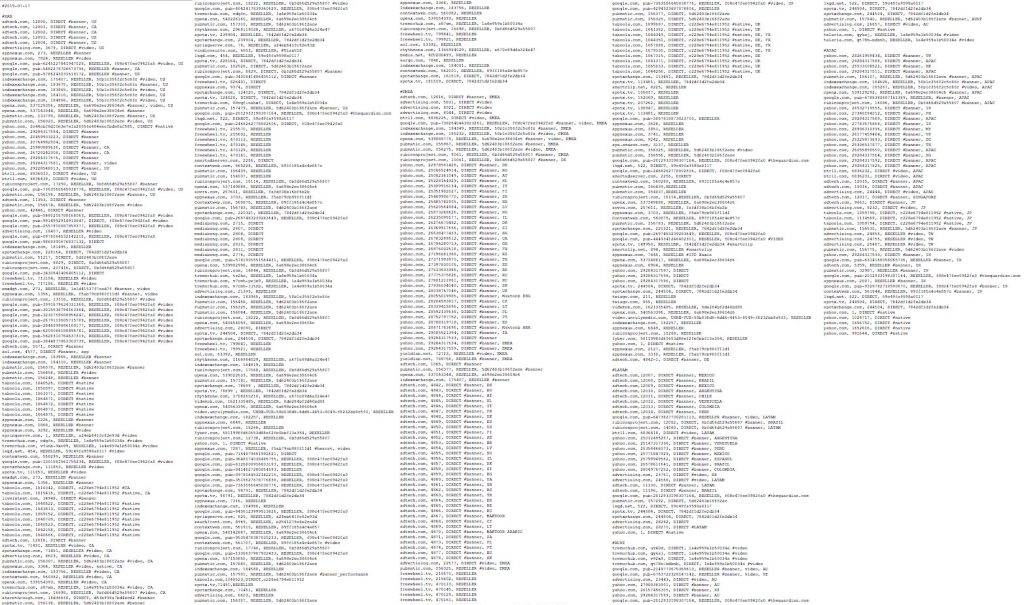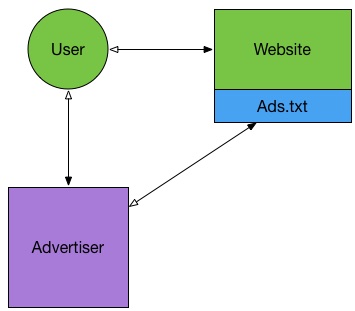Working with publishers from the service provider side has been enlightening on many a topic. Ad tech is a fascinating industry that really appears to want to change, but really never does. Technology comes and goes and laws are made that aren’t always followed. At the end of the day things are definitely in better condition than they were some years back, but a lot of the core of how the industry works and reacts to changes and new things is still very much broken (in my gloomy opinion).
Some of the better things to have been released into the advertising world in recent times definitely have to be in the verification and validation side, such as ads.txt. Ads text is a means with which the publisher of some web content can state, for all to see, who is permitted to sell their inventory. What goes into the ads.txt file (which is hosted at the root of the publisher’s site) is a list of advertising networks and their associated identifiers for that particular publisher. The publisher lists everyone they recognise and the networks can verify that the inventory is green-lit.
There’s no shortage of players on the demand side, and you’d expect a publisher (the operator of a business) to shop around and get the best deal they can – higher CPMs, better fill.. the usual. This involves shaking hands with a lot of these players and, after some time, you could end up meeting quite a few…

Take this example, the ads.txt over at huffpost.com. I pulled it in August 2019, and it was over 520 lines (not including the 10s of blank lines at the end). The Huffington Post have a most successful business built around their content, and you can certainly see by their ads.txt size that they’ve been working. Shaking hands, making deals, shifting scripts and suppliers while they try to get the mix right. All of this is a sign of a healthy ad-tech team that’s trying to get the best out of their monetisation as possible.
Now to the myth that ads.txt files can be too big: Here’s the thing, they can’t. I’ve heard this numerous times from publishers and account managers, that a publisher is either concerned with the size of their ads.txt or are flat out refusing to add lines to it without an explanation of what each is. The excuse commonly given is one of increasing size, though no explanation of why this is a problem is ever appended. This is a misunderstanding of course – ads.txt files cannot be too large. They don’t indicate anything other than how active the publisher is in terms of optimising their ad stack.
There’s a couple of possible incorrect assumptions behind this idea – the first being that the size of the file somehow shows the publisher in a bad light. This is definitely only speculation on my part, but I wonder if a larger file could make the publisher feel as though viewers may assume that they’re desperate, poorly informed (in terms of advertising technology) or simply careless? Could they feel as though providing validation to more networks is leaving themselves too open?
That last ponderment leads me to my next suspicion: that having more items in the ads.txt file somehow results in the publisher’s website being less secure. This would also be an incorrect assumption – every line added to an ads.txt file is put their for a reason, to drive demand. Each one is a business agreement with some vendor, be it a DIRECT relationship with a network or a setup with a RESELLER. Trust has to be extended to these entities for the relationship and use of ads.txt to work. If a reseller is to ask for more lines to be added for their ads.txt verification, halting such an action would be foolish. If trust wasn’t established entirely in the first place, why run the reseller’s SSP at all?
What I’m getting at this is: either trust them entirely or not at all. If you’re concerned about their practices ask them to clarify how they work. Any decent reseller or network that works with other networks (and therefore provides ads.txt lines to a publisher) is going to eventually ask for more network lines to be added – this should be expected. Trust should be given to the reseller who in turn has to give their trust to their affiliates and so on. You’re trusting that a network represents you in a trustworthy way: If a partner is not to be trusted, the number of lines they provide to a publisher is of no consequence.
The last suspicion I harbour is one of size: Would a publisher, knowing that size is important on the web, ever consider the actual byte size of an ads.txt file? If so, this would also be a poor reason with which to refuse updates to an ads.txt file. The file itself is never requested by the user, while browsing, and therefore its size is not important:

The user loads a website, which contains some content. The content may contain some ads that are also requested, but the user’s browser never makes contact with the ads.txt file. The file is only downloaded by an advertiser offline – This doesn’t happen in real time and it doesn’t affect the user one bit. The file is also cached by the advertiser and isn’t simply requested again and again for every impression it needs to validate.
Ads.txt files are simple creatures: They serve a single, important purpose and are not shy size-wise. They’re a mandatory tool used to draw a border around what is allowed in terms of sellers/resellers – it’s a whitelist. Just remember that before ads.txt, everything was permitted – now you at least have some control.


